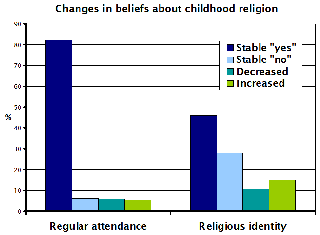 Trying to work out why and how religious beliefs change over their lifetime is challenging because hard data are rare. Instead, researchers often have to resort to asking adults what they believed when they were children.
Trying to work out why and how religious beliefs change over their lifetime is challenging because hard data are rare. Instead, researchers often have to resort to asking adults what they believed when they were children.
Of course, everyone knows that such memories are not 100% reliable, but just how unreliable is hard to judge. David Hayward, at the University of Michigan, and colleagues, have been able to quantify it by using data from a survey that’s been running in Rhode Island since 1959.
The survey was conducted in waves, starting with mothers and their infant children, and then following up with three further surveys (the most recent was in 2001). In each survey, they asked about current religious behavior (“Do you regularly go to a church or other place of worship?”) and current religious identity (“Do you consider yourself a religious person?”). Crucially, they also asked about retrospective childhood religious behavior and retrospective childhood religious identity.
Comparing the earliest and last responses for each participant, they found that both current religious behaviour and current religious identity did change for around 20-30% of people. That’s as you might expect: some people became less religious, some people became more religious (this was more common), but most people stayed the same.
What was interesting is that recollections of childhood religion also changed.
In fact, most people were consistent in their reports of childhood religious behaviour. Only 10% changed their minds about whether or not they had regularly gone to church. However, 25% of people changed their minds about whether they considered their childhood selves to have been religious.
When Hayward and colleagues crunched the numbers, they found that current religious identity significantly influenced changes in childhood religious identity. In other words, people tend to change their ideas about their childhood religious identity to align it with their current identity. They comment that:
This pattern of results is consistent with predictions based on self-appraisal theory. Because we are motivated to see ourselves as basically stable on important dimensions across the life course, and to reduce perceived dissonance between past and present selves, it is likely that when people reevaluate their religiousness they tend to harmonize past identities with present ones.
That wasn’t the case with childhood religious behaviour. Perhaps that’s because behaviour is more objective, and can be independently verified. But maybe it’s also because your past behaviour is easier to explain away.
For example, if you don’t go to church now, you can explain away your childhood church going as simply the result of family pressure. SImilarly, current churchgoers can justify their lack of attendance in childhood as a result of family shortcomings.
You can explain away childhood behaviour without having to disturb your precious beliefs about your own values. But you can’t explain away childhood identity in this way so, in order to restore mental harmony, the temptation is to invent new memories!
![]() Hayward RD, Maselko J, & Meador KG (2012). Recollections of Childhood Religious Identity and Behavior as a Function of Adult Religiousness. The International journal for the psychology of religion, 22 (1), 79-88 PMID: 22844186
Hayward RD, Maselko J, & Meador KG (2012). Recollections of Childhood Religious Identity and Behavior as a Function of Adult Religiousness. The International journal for the psychology of religion, 22 (1), 79-88 PMID: 22844186
 This article by Tom Rees was first published on Epiphenom. It is licensed under Creative Commons.
This article by Tom Rees was first published on Epiphenom. It is licensed under Creative Commons.













